
Vertebrate Zoology
Scope & Guideline
Connecting Researchers to the World of Vertebrates
Introduction
Aims and Scopes
- Taxonomic and Systematic Studies:
The journal is dedicated to the systematic classification and description of new vertebrate species, with a significant number of papers focusing on reptiles, amphibians, and fish. - Morphological Research:
There is a consistent emphasis on detailed morphological studies, including cranial osteology and vertebral morphology, which are crucial for understanding evolutionary relationships. - Biogeography and Conservation Insights:
Papers often explore the biogeographical distribution of species and provide insights into conservation issues, highlighting the ecological importance of various vertebrate clades. - Integrative Taxonomy:
The journal promotes integrative approaches that combine morphological, molecular, and ecological data to resolve taxonomic uncertainties and clarify species boundaries.
Trending and Emerging
- Cryptic Species Discovery:
There is an increasing focus on identifying cryptic species within known taxa, highlighting the hidden diversity in various vertebrate groups and the importance of molecular techniques in taxonomic studies. - Impact of Climate Change on Species Distribution:
Research addressing the effects of climate change on vertebrate distributions and biodiversity is gaining traction, underlining the relevance of conservation biology in the context of environmental changes. - Phylogenetic and Evolutionary Studies:
The journal is seeing a rise in papers that explore phylogenetic relationships using advanced molecular techniques, contributing to a deeper understanding of evolutionary processes and diversification. - Integrative Approaches to Taxonomy:
There is a notable trend in the use of integrative methods that combine morphological, molecular, and ecological data, reflecting a modern approach to resolving taxonomic ambiguities and enhancing species descriptions.
Declining or Waning
- General Morphological Studies:
There has been a noticeable decline in papers focusing solely on general morphological studies without specific taxonomic implications, as researchers increasingly favor integrative approaches. - Broad Taxonomic Reviews without New Discoveries:
Papers that provide broad taxonomic reviews without the identification of new species or significant findings are becoming less common, reflecting a shift towards more focused and novel contributions. - Traditional Taxonomy without Molecular Support:
The reliance on traditional taxonomic methods without incorporating molecular techniques appears to be waning, as the field moves towards more comprehensive integrative methodologies.
Similar Journals
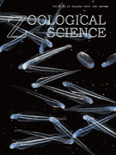
ZOOLOGICAL SCIENCE
Unveiling Nature's Secrets Through ResearchZoological Science, published by the Zoological Society of Japan, is a leading journal dedicated to the fields of animal science and zoology. With its ISSN 0289-0003, this respected publication has established itself as a prominent source of scientific research, attaining a commendable Q2 ranking in the 2023 category of Animal Science and Zoology. Spanning over three decades, from 1992 to 2024, the journal offers a valuable platform for scholarly articles that explore various aspects of zoology, including ecology, behavior, and evolutionary biology. Although it operates under a traditional subscription model, its contributions are supported by a robust community of researchers and professionals who value its insights. The journal strives to foster academic discourse and insights that drive understanding and conservation of wildlife, making it an essential resource for students and established experts alike. The publishing headquarters located in Tokyo, Japan, further enhances its international reach and influence in zoological studies.

CONTRIBUTIONS TO ZOOLOGY
Unveiling Insights into Animal Behavior and SystematicsCONTRIBUTIONS TO ZOOLOGY, published by BRILL, is a premier scholarly journal dedicated to advancing the field of zoological sciences. With an ISSN of 1383-4517 and an E-ISSN of 1875-9866, this journal serves as a vital platform for researchers, professionals, and students seeking to share their findings and insights related to animal science, ecology, evolution, and systematics. Recognized for its high academic standards, it ranks in the top quartile (Q1) for Animal Science and Zoology, and Q2 for Ecology, Evolution, Behavior, and Systematics, reflecting its significance and influence in the scholarly community. The journal has been consistently published since 1994 and continues to contribute pivotal knowledge that informs and shapes contemporary zoological research. Researchers can access the journal through traditional subscription models, ensuring broad dissemination of its impactful articles and studies. Contributions to Zoology plays an essential role in fostering collaboration and discussion within the zoological community in the Netherlands and beyond.

ORGANISMS DIVERSITY & EVOLUTION
Charting Evolutionary Pathways: A Journey Through DiversityOrganisms Diversity & Evolution is a premier academic journal published by Springer Heidelberg, dedicated to advancing the fields of ecology, evolution, behavior, and systematics. Established in 2001 and continuing through 2024, this journal plays a crucial role in disseminating high-quality research that explores the complexities of biological diversity and evolutionary processes. With a commendable 2023 Scopus ranking of #253/721 in its category, placing it in the 64th percentile, and categorized in the Q2 quartile for Ecology and Evolution, it consistently attracts contributions from leading scientists and researchers worldwide. Although it operates on a subscription basis, the journal's rigorous peer-review process and dedication to impactful scientific discourse make it an invaluable resource for academics, practitioners, and students keen on understanding the intricate relationships that shape our biodiversity. By highlighting innovative research and fostering discussions on urgent ecological challenges, Organisms Diversity & Evolution serves as a vital platform for those committed to conservation and evolutionary biology.
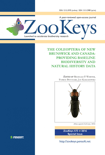
ZooKeys
Illuminating the Path of Ecological Innovation.ZooKeys, published by Pensoft Publishers, is a premier open access journal dedicated to all aspects of zoology and related biological disciplines. Since its inception in 2008, ZooKeys has emerged as a leading platform in the field, consistently showcasing groundbreaking research that spans diverse areas including animal science, ecology, and paleontology. With an impressive impact factor and categorized in the Q1 quartile for several categories such as Agricultural and Biological Sciences and Insect Science, the journal is recognized for its scholarly contributions, attracting researchers and professionals globally. Located in Sofia, Bulgaria, ZooKeys not only enhances the visibility of its publications through rigorous peer review but also ensures accessibility to vital findings, furthering academic discourse. As the journal continues to converge research efforts through 2024 and beyond, it remains an invaluable resource for students and academics aiming to stay at the forefront of zoological and ecological innovation.

RAFFLES BULLETIN OF ZOOLOGY
Advancing Knowledge in Animal Science and EcologyRaffles Bulletin of Zoology, published by the National University of Singapore's Lee Kong Chian Natural History Museum, serves as a prestigious platform for the dissemination of cutting-edge research in Animal Science and Zoology, as well as Ecology, Evolution, Behavior and Systematics. With a current impact factor reflective of its Q2 category in both fields, this journal not only enhances its visibility in the academic community but also provides valuable insights into the complexities of biodiversity and conservation efforts. Covering a wide array of topics, Raffles Bulletin facilitates interdisciplinary collaboration and serves as an essential resource for researchers, professionals, and students alike. It is indexed in Scopus, ranking #233 out of 490 in Animal Science and Zoology and #406 out of 721 in Ecology, ensuring that the research published contributes significantly to the global discourse on wildlife and ecosystem management. Since its inception in 1996, this journal has bridged gaps in knowledge and continues to foster a deeper understanding of the living world.
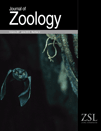
JOURNAL OF ZOOLOGY
Bridging foundational research with innovative zoological studies.JOURNAL OF ZOOLOGY, published by Wiley, stands as a premier scholarly journal in the fields of Animal Science and Zoology, renowned for its outstanding contributions to the knowledge of animal biology and ecology. With an impressive impact factor and a strong ranking in the Q1 category for Animal Science and Zoology, as well as Q2 for Ecology, Evolution, Behavior, and Systematics, the journal rigorously engages with both foundational research and groundbreaking discoveries since its inception in 1830. Located in Hoboken, New Jersey, this journal is dedicated to fostering the academic community's understanding of zoological sciences, providing access to important research that shapes wildlife conservation efforts and ecological studies. Although the journal does not currently offer open access options, it continues to attract significant attention, as evidenced by its strong Scopus rankings in related categories. Researchers, professionals, and students will find invaluable resources in the JOURNAL OF ZOOLOGY to advance their understanding of animal life and the ecological challenges it faces today.

CANADIAN JOURNAL OF ZOOLOGY
Exploring the Wonders of Zoology and BeyondWelcome to the Canadian Journal of Zoology, a leading academic journal in the fields of Animal Science and Zoology as well as Ecology, Evolution, Behavior and Systematics. Published by Canadian Science Publishing since 1965, this esteemed journal serves as a vital platform for researchers, professionals, and students to disseminate and engage with significant findings in zoological and ecological research. With an impact factor placing it in the Q2 category and rankings reflecting its influence (201/490 in Animal Science and Zoology; 372/721 in Ecology), the journal is committed to advancing the understanding of animal biology and environmental interactions. Although currently not an open access publication, it provides comprehensive resources and studies that are crucial for the academic community. Based in Ottawa, Canada, the journal continues to push the boundary of knowledge right up to 2024 and beyond, making it an essential resource for anyone dedicated to the life sciences.

RECORDS OF THE AUSTRALIAN MUSEUM
Exploring the Depths of Animal Science and EcologyRecords of the Australian Museum is a leading journal in the fields of Animal Science, Ecology, History, and Museology, published by the renowned Australian Museum in Sydney, Australia. With a commitment to advancing knowledge and understanding of natural history and cultural heritage, this journal provides an essential platform for original research, reviews, and significant findings relevant to its diverse academic audience. The journal encompasses a broad scope, including studies in ecology, evolution, behavior, systematics, and the history of science, attracting contributions from leading scholars and professionals. Notably, it ranks highly in various categories, achieving a Q1 ranking in History and Museology, reflecting its impact and prestige within the academic community. Although it operates under a traditional access model, the journal ensures that its robust compilation of cutting-edge research remains vital to researchers, professionals, and students aiming to stay informed of the latest developments in their fields. With converging years of publication since 1983, Records of the Australian Museum continues to play a pivotal role in disseminating critical insights and fostering discussions that shape our understanding of both the natural world and our cultural heritage.
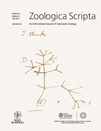
ZOOLOGICA SCRIPTA
Elevating the discourse in animal science and systematics.Zoologica Scripta, published by Wiley, stands as a distinguished journal within the fields of Animal Science and Zoology, Ecology, Evolution, Behavior and Systematics, Genetics, and Molecular Biology. With its inception dating back to 1971 and a convergence year extending to 2024, this journal consistently provides a platform for high-quality research, earning a Q1 ranking in two key categories and solid performance in additional fields, as evidenced by its significant Scopus rankings and impressive percentiles. Notably, it ranks 36 out of 490 journals in Animal Science and Zoology, placing it in the 92nd percentile. While Zoologica Scripta operates under a traditional access model, its rigorous peer-review process ensures that only the most impactful studies make their way into its pages. With a focus on advancing our understanding of biodiversity and evolutionary processes, this journal is indispensable for researchers, professionals, and students committed to the ongoing exploration of animal sciences and ecological studies.
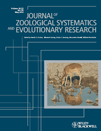
JOURNAL OF ZOOLOGICAL SYSTEMATICS AND EVOLUTIONARY RESEARCH
Exploring the Depths of Evolutionary InsightsThe Journal of Zoological Systematics and Evolutionary Research, published by Wiley-Hindawi, stands as a premier academic journal since its establishment, showcasing cutting-edge research in the fields of Animal Science, Zoology, and Ecology. With an impressive track record spanning from 1963 to the present, this journal has earned a Q1 classification in both Animal Science and Ecology, as well as recognized rankings in Genetics and Molecular Biology. Its impact is highlighted by its Scopus ranks, placing it in the top percentile for relevant categories, underscoring its vital role in advancing knowledge and understanding within these disciplines. Researchers, professionals, and students will find a wealth of high-quality, peer-reviewed articles that contribute to the evolutionary understanding of biodiversity and systematics. Though not an Open Access journal, it remains accessible to a wide audience committed to exploring the intricacies of zoology and evolutionary biology.